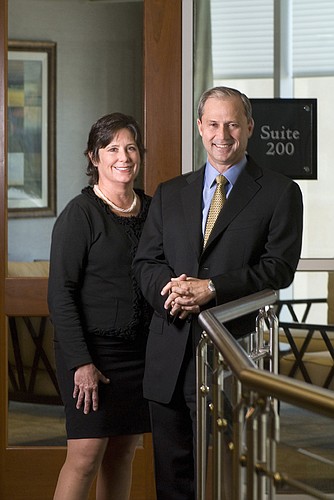- October 16, 2024
-
-
Loading

Loading

When they launched their law practice specializing in securities and business litigation in 2008, Christopher Vernon and Susan Healy didn't foresee the depths of the financial crisis.
But their practice grew as things got worse. “Our practice is countercyclical,” Vernon acknowledges. “When the market is doing well, the problems don't come to light.”
Vernon and Healy, both alumni of Naples securities attorney Tom Grady's firm, identify financial products they think harm investors and find their clients through accountants, estate-planning attorneys and personal-finance advisers. (Grady most recently served as interim president of Citizens Property Insurance Corp. and as the commissioner of the Florida Office of Financial Regulation.)
Vernon and Healy tick off the list of areas ripe for financial shenanigans: tax shelters, hedge funds, private equity deals, structured products such as “principal protected notes,” non-traded real estate investment trusts and high-cost investment funds that masquerade as insurance. Many of these have high commissions and improper disclosure as common elements.
“We identify products or behaviors that harm investors,” says Healy, who was named 2011 Woman Lawyer of the Year by the Collier County Women's Bar Association and currently serves as the president of the Florida Association for Women Lawyers.
One new area they're delving into is scams involving the EB-5 visa program. This is a program under which foreigners can obtain residency here in exchange for investing in a U.S. commercial enterprise that creates or preserves jobs. But the program has attracted unscrupulous operators who take advantage of foreigners, Vernon says.
Most often, the Naples law partners represent high-net-worth individuals, estates, municipalities and businesses in securities cases that end up in arbitration and where settlements are usually reached before a final hearing. These are some of the toughest cases to handle because the securities industry has better odds of prevailing in that venue than in courts, which is one reason many financial services firms require clients to sign a contract agreeing to resolve disputes by arbitration.
The partners decline to cite financial results of their firm since they split from the Treiser Collins firm in Naples, but they say the area is a magnet for sophisticated financial scams. “Naples is a place where there's a lot of money to invest,” Vernon says. “You have a lot of bad investment professionals.”
Often, Vernon and Healy work jointly with outside counsel on larger cases. They've deliberately chosen this path versus hiring extra lawyers on staff. “You can either add a bunch of overhead or come together [with other firms],” Vernon says. “Some states require us to partner with local counsel.”
The key for a smaller firm such as Vernon Healy to succeed against much larger rivals is to have stellar support staff and technology. “We are facing huge firms on the other side,” says Healy, who streamlined the systems for the Fourth District Court of Appeal when she was a staff attorney there before moving to Naples. “I can't imagine we'd be able to do this with paper documents or pulling down the law books.”
Vernon and Healy have developed a series of sophisticated websites that serve mostly to educate people about the pitfalls of certain investment products. The websites, combined with speeches to accountants and other financial industry professionals, help the lawyers market their services broadly and help establish them as experts in their field.
For example, ReitAttorneys.com publishes news and information about non-traded real estate investment trusts. “We've worked really hard on that to keep it as dignified and substantive as possible,” says Vernon, who like Healy has two decades of law practice. “Neither one of us comes from a personal-injury background,” he adds.
The use of the Internet has broadened Vernon Healy's practice beyond Naples, and the firm now does business around the country. “The Internet has changed everything,” Vernon says. “We've represented investors in 40 states.”
The duo shrugs off recent government attempts at greater regulation of the financial services industry. “Regulators can only react,” Vernon says. “If they can put us out of business, I'll die a happy man.”